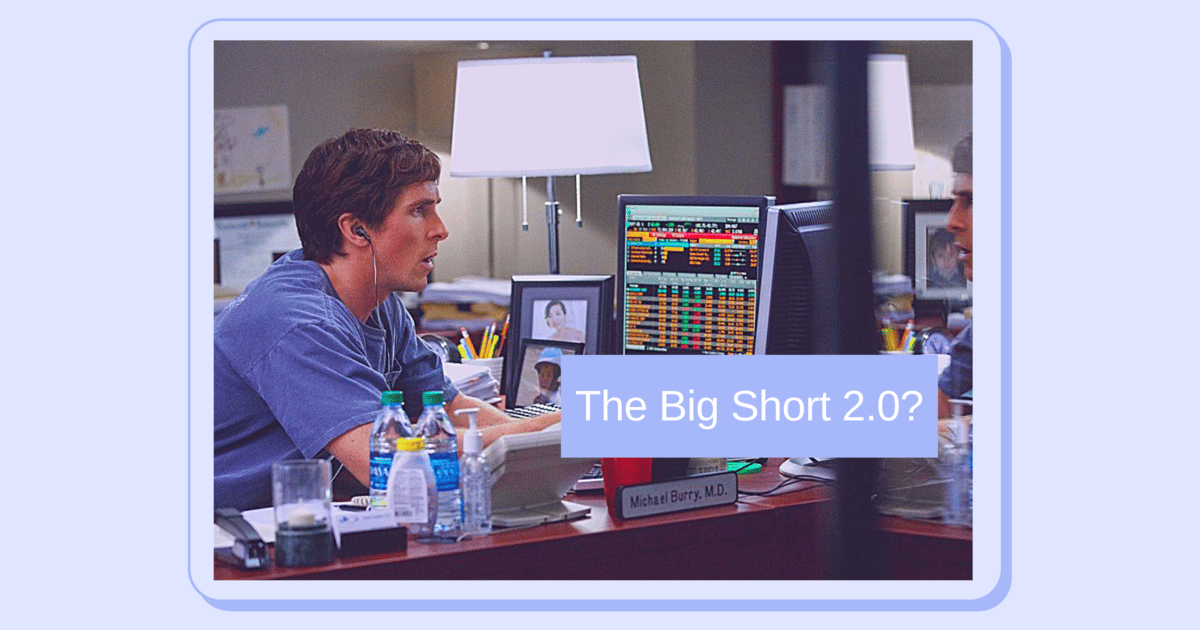- The Weekly Rallie
- Posts
- The Big Short 2.0? 👀
The Big Short 2.0? 👀
As it turns out, the real winners of the recent banking crisis ...were the short sellers.


"It is ludicrous to believe that asset bubbles can only be recognized in hindsight."
— Michael Burry

👋 Friends, Rallie here. Keeping the crypto and tech dream alive, one newsletter at a time.

On the menu:
👀 The Big Short 2.0?
🗞️ Headlines That Hit
🥇 Refresh: Short Selling
💯 Top Tweets

The Rallie Recap
👀 As it turns out, the real winners of the recent banking crisis ...were the short sellers.
It's now April, but March’s banking chaos proved to give short sellers their biggest profits since the 2008 financial crisis, sitting on more than $7.25B USD in gains from the mass sell-off of bank shares. (Hint: head to the refresh section for a recap on short selling)
The collapse of Silicon Valley Bank followed by the emergency rescue of Credit Suisse headlined a turbulent month for the global banking sector.
Fears of contagion sent bank shares plummeting across the U.S. and Europe, with the losses compounded by further monetary policy tightening from the Feds.
And as the crisis accelerated, JPMorgan Chase analysts wrote (on March 17!) that short sellers were "working collectively to drive runs on banks," suggesting that short sellers were to blame for the chaos.
Interestingly enough though, interviews and public postings show that some short sellers placed bets against regional banks well before the crisis hit. For example, Porter Collins, co-founder of hedge fund manager Seawolf Capital, said he saw how rising interest rates would likely hit banks, saying, "There were warning signs that were pretty easy to see for those who looked," and in early 2022 he shorted SVB, Signature, First Republic, Silvergate and Charles Schwab Corp. Damn.
Regardless, how much short sellers contributed to the downward spiral of these banks raises the question about whether shorts sellers act as market watchdogs (and should we be taking notes?) or are opportunistic investors who profit from others’ decline.
In reality, it's probably a bit of both, summed up nicely by Dennis Kelleher, President and CEO of Better Markets, a nonprofit industry group in Washington, "The shorts in the months before the collapse were accurately warning the markets...that the bank (SVB) was being dangerously mismanaged. The problem is once that collapse happened, shorts with various motives started targeting other banks."
Good Morning Everyone! Hedge funds made $7 billion short selling banks last month. March was the single most profitable month for short sellers in the banking sector since the 2008 financial crisis.
— Genevieve Roch-Decter, CFA (@GRDecter)
12:13 PM • Apr 10, 2023

Headlines That Hit
❄️ Is crypto winter ending? Here's hoping. Bitcoin just cracked $30K USD for the first time in 10 months.
🚩 Three years later, brokerage platform Robinhood has agreed to pay a $10M USD penalty for network outages in March 2020, which investigators say “harmed main street investors.”
🤖 Somehow, Walmart keeps making its way into this newsletter, and this time it's for powering its warehouses with robots and automated claws.
📈 Mcdonald's announced a recent restructuring that included layoffs, promotions and new roles for U.S. employees. And today, the company's stock price hit an ATH.
🔐 Disgraced Theranos founder, Elizabeth Holmes, just lost her attempt to stay out of prison. A judge ordered her to surrender to authorities on April 27 to begin her 11-year sentence.

Rallie Refresh: Short Selling
In case you don't feel like rewatching one of the greatest movies of all time (we're talking about The Big Short obviously), here's our quick review on what exactly short selling is:
Shorting a stock is a strategy where an investor borrows shares of a stock from someone else and sells them on the market, hoping to profit from a decline in the stock's price.
When you short a stock, you're essentially betting that the price of the stock will go down. If the price does fall, you can buy back the shares at a lower price and return them to the lender, keeping the difference in price as profit.
However, if the stock price rises, you'll be forced to buy back the shares at a higher price, resulting in a loss.
Short selling can be risky, as there's no limit to how high a stock price can go, which means your potential losses are theoretically unlimited.
It's often used by hedge funds and experienced investors who are willing to take on higher risks in exchange for the potential for higher returns, and to make big bets against companies they think are overvalued or are headed for trouble.

Trending Tweets
Our fav funnies to get you through the day.
“Bitcoin just crossed $30k”
— Dr. Parik Patel, BA, CFA, ACCA Esq. (@ParikPatelCFA)
2:05 PM • Apr 11, 2023
Sure delayed gratification is great, but have you ever heard of immediate gratification?
— Ginny Hogan (@ginnyhogan_)
1:49 PM • Apr 2, 2023
I told my kids there's an Easter egg with $100 somewhere in the backyard. There isn't, but now I get to have a quiet Sunday indoors.
— Douglas A. Boneparth (@dougboneparth)
2:20 PM • Apr 9, 2023
6:00pm *turns on Netflix*
2:00am *decides what to watch*— Eden Dranger (@Eden_Eats)
1:03 AM • Apr 5, 2023
Congrats, you made it to the end!
That's all for today. Stay hungry & we'll catch you next time. ✌️
Let us know what you think |
DISCLAIMER: This is not financial advice. This newsletter is strictly educational and is not investment advice or a solicitation to buy or sell any assets or to make any financial decisions.